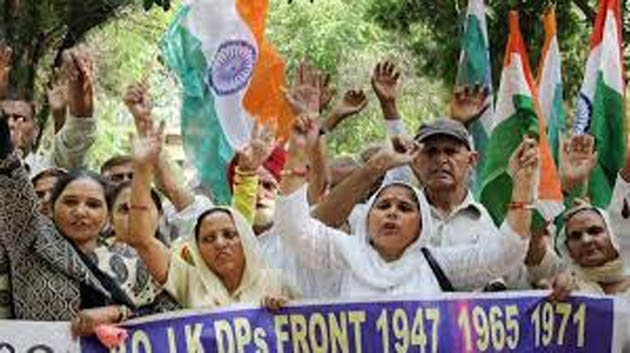Rohit Khajuria, Pt. Chaman Lal Sharma
Identity is the difference or character that marks off an individual or collective from the rest of the same kind. It is a sort of selfhood, the sense of who someone is. Social identity enables an individual or community to identify one self and to live proudly for being a host of a particular identity. These identities constitute ethnicity for a group having common characteristics especially with respect to the ancestry, caste, clan, culture, and language or sub-regional experiences. Now the fundamental question that needs political and civic attention is that Pakistan Occupied Jammu & Kashmir (POJK) displaced community popularly known as DPs (Displaced Persons) are not considered as ‘Paharis’ or in other words they are devoid of their own identity.They possess all the attributes that prove them to be ethnically “Pahari” yet they were not accorded PSP (Pahari Speaking People) status and position of incumbent government for granting them ST status also stands unclear. POJK is the part of the erstwhile Princely State of Jammu & Kashmir where these “Paharis” were residing prosperously in utmost communal harmony with Muslims and others up to October 1947.Subsquent on Partition of India and evil designs of Pakistan led to a mass massacre and forced exodus of millions of these Paharis from their homeland currently referred to as POJK constituting Mirpur, Bhimber, Pallandri, Rawalakot, Bagh and Muzzafarabad.
It is pertinent to mention that this community shares common ancestry, culture, language, sub-regional experiences etc. The POJK/Pahari community has maintained its cultural distinctiveness despite of getting displaced from a geographically distinct place POJK in 1947.The language spoken by this community is Pahari which is a part of group of Pahari-Pothwari dialect which falls within Indo-Aryan language family spoken in POJK and western parts of Jammu & Kashmir. It is known by different names, such as Pahari, Pothwari, Pothohari and Mirpuri. Further POJK/Pahari community has maintained its cultural continuity from the past by virtue of practising various rituals and ceremonies in marriage which represent the distinctive Pahari traits of the community.
The extent of marginalisation of this community can be evaluated from the fact that their third generation is still striving hard without any special reservation or relaxations. The ownership rights to their allotted lands are still not granted, scholarships for their children, special package, reservation in jobs or educational Institutions have not been granted in favour of POJK DPs of currently residing in Jammu division.
Time and again the members of this community have raised their issues but they have been largely unaddressed that furthers their deprivation and marginalisation. The question arises why a forcefully displaced community from their homeland(POJK) now residing in other districts excluding Poonch and Rajouri was deprived of the “Pahari” status by the competent authorities despite presenting their proofs of residence of POJK such as Form-A etc. The POJK community members residing in the districts of Jammu, Kathua and Udhampur have everything in common with the Paharis of Poonch and Rajouri or a POJK DPs residing in these districts. However, the Pahari Speaking now granted Schedule Tribe (ST) yet the POJK/ Paharis of Jammu, Kathua and Udhampur have the challenge to prove themselves as a Pahari? If a Kashmiri residing whether in Anantnag, Srinagar, Jammu, Dehli, or any other part of the country or abroad remains a Kashmiri and postal ballots for elections, fellowships, reservations are granted to them irrespective of their current dwelling place, how come a POJK/Pahari migrant loses identity of a Pahari in the eyes of the competent authorities residing outside Rajouri and Poonch? The rationale of associating identity to a fixed geography is indiscernible which needs thorough revision.
In the last seven decades of despair the POJK Community was hoping for the best when the present P.M in his first tenure delivered on the promise of Relief Package of 5.5 lakhs to each displaced family which they were expecting to be 5 times more than what was delivered. Moreover, after abrogation of Article-370 in P.M’s second tenure, the POJK DPs were hoping for one-third representation in the Legislative Assembly out of the 24 seats reserved for the POJK but again they got disappointment as only a single nomination one seat was declared in their favour. During the same period, the Pahari Speaking People (PSP) and Schedule Tribe (ST) were granted but POJK DPs were neglected. This community has always remained loyal to the nation despite all odds. The first displaced generation of POJK community which somehow managed to escape the carnage and bloodshed was made to live in a survival mode for years. The extent of their misery can be measured from the fact that they had to consume barks, leaves of plants and rice water for months for their subsistence. Despite of all these barriers they have conserved their culture and language in different districts of Jammu Division and in other states spreading a message of brotherhood, perseverance and plurality. Depriving such a community of their identity rights- ST – Pahari shall be a matter of utter disgrace to the martyrs of POJK who laid down their lives for safeguarding the territory of Jammu & Kashmir.
Despite the lapse of seven decades and eighth in the run, these POJK DPs with their distinct language, ethnicity are still referred to as Refugees, Poonchis etc. by the natives and others which clearly shows that they have a distinct identity. If they are having identity other than the natives then why the authorities reject their Pahari right which raises a very serious question of identity – Who are they? It is true “The Pahari identity of POJK DPs is critically endangered” and no one knows for how long it shall be? As referred in a couplet by Mirza Ghalib:
“Aah ko Chaiye ik oomar asar hone tak
Kon jeeta hai teri zulf kay sarr hone tak
Hamne mana kay tagaful na karogay lekin
Khaak hojayeingay hum, tumko khabar hone tak”
(The authors are PoJK activists)


